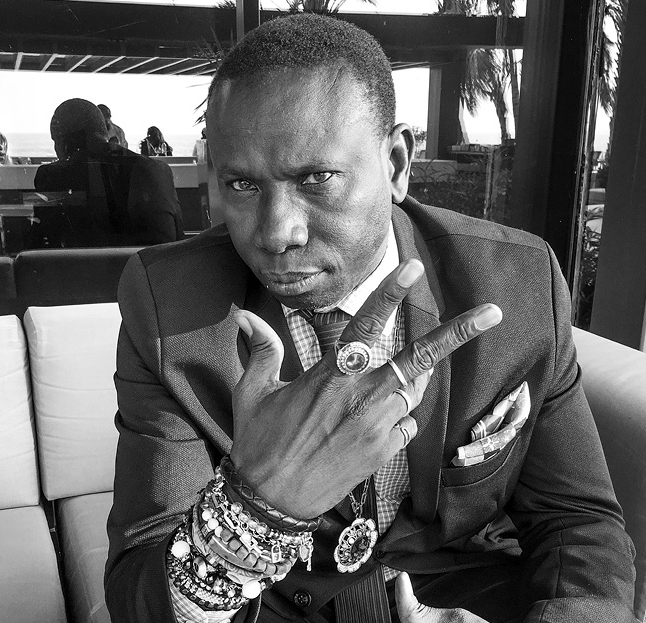Senegal Let It Go

Art embraced lightly, Dakar, Senegal.
Throughout my time in Senegal, I heard people talking about musla: taking life lightly, not being too serious about things that don’t warrant it.
But I only appreciated the full significance of this right at the end of my stay, when I was getting ready to leave. Dakar, the capital, had just opened a new airport, a shining beacon of modernity, but one that was notably far from the city center. Having spent over an hour getting there, down one new toll road after another, I arrived with a little over ninety minutes until my flight. And then I realized. My passport was missing. Panic flooded through me. There definitely wasn’t time to go back and retrieve it. Already, I could see the nightmare of delays, logistics, and extra costs ahead of me. Frantically, I told one of the airport staff what had happened.
Don’t worry, he said. In a second, I had been given his phone and was calling my hotel. Don’t worry. The passport was found, put in a car, and rushed to the airport. Don’t worry. Regular updates were phoned in. Don’t worry. Calmly, everyone who needed to know was informed: security, passport control, check-in staff. As my stress receded, the small crowd of people who had come to my aid started to tease and joke with me. And the precious cargo duly arrived, just twenty minutes before takeoff. I was escorted through security, rushed to the front of the queue, and swiftly boarded as the last passenger. By contrast, I’ve missed flights at Heathrow or O’Hare with much more time to spare, and much less to worry about.
That was my personal experience of a value that is distinctly Senegalese. The very relaxed shrug of the shoulder: things happen, don’t worry about it. Just let it go. Stress only makes things worse. In so many different ways it is an easygoing country: people intervene not to escalate potential arguments but to defuse them. If there is a car crash, people don’t rubberneck in the secret hope that something will kick off. They get out of their cars and try to calm people down. In a country that has, in its southern region, seen one of the world’s longest-running civil wars, between people there appears to be a real aversion to unnecessary conflict. Rather than holding grudges or starting arguments, people prefer to tease each other; to defuse tensions with humor. Don’t let situations or conversations get too heavy; instead keep things light and informal. Why make things difficult if they don’t need to be?
The same attitude extends into personal relationships and even marriages. Polygamy is common, but doesn’t create the dynamics you might expect, with second and third wives resenting their predecessors. Instead, being the second wife is seen as something to be prized: you have less responsibility, greater freedom, and more time to yourself. Don’t worry about what you don’t have; look at the advantages of your own situation. Don’t create an argument where there doesn’t need to be one. Let it go!
There are all sorts of indirect benefits from such a relaxed, calm, and easygoing culture. One is a thriving art, music, and comedy scene. In Senegal, you find the opposite of bureaucracy. If you need to go somewhere, find something out, or track someone down to interview for a story, people try to help you. The ethos is about making things happen, not putting barriers in their way. And if an individual can’t help, they will usually try and find a friend who can. It’s a permissive environment and creativity thrives as a result. I met artists who had come to Senegal specifically because they found it an ideal place to work.
Of course there are the less convenient sides of such a relaxed culture. The easygoing ethos extends to time. People won’t mind if you are late for things, and they certainly won’t expect you to mind if they are. In the same way, zebra crossings and traffic lights are treated more as decorations than instructions. Things get done, rules are observed in spirit, but the ticking clock and the letter of the law are not what people worry about. The attitude to religion is similar: in a country where 95 percent of the population is Muslim, belief is worn lightly, and people are given the freedom to practice as they see fit.
The easygoing culture of Senegal might not be for everyone. But we could all benefit from thinking, as many Senegalese do, about when is the right time to take something seriously, and when we should just let it go. In our personal and professional lives, there are so many things that can be magnified into seeming like much greater disasters than they really are. And by engaging in disputes, holding grudges, and worrying about things or situations that don’t warrant it, we waste so much energy that could find more useful outlets. Senegal shows that we can go a long way on letting things go: it helps us to forge better relationships, relax in ourselves, and focus on the things that really matter in life.